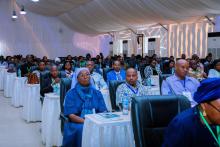Tanzania Launches Pandemic Fund Project to Strengthen Health Emergency Preparedness and Response
Mwanza, Tanzania – The President’s Office – Regional Administration and Local Government, the Prime Minister’s Office and the Ministry of Health of the United Republic of Tanzania in collaboration with the World Health Organization (WHO), the United Nations Children’s Fund (UNICEF), and the Food and Agriculture Organization (FAO), today officially launched the Pandemic Fund Project in Mwanza.
This landmark initiative, supported by catalytic funding from the Pandemic Fund, aims to strengthen Tanzania’s capacity to prevent, prepare for, and respond to future health emergencies and pandemics. Tanzania received a US$25 million grant from the Pandemic Fund and mobilized an additional US$7 million in co-investment and US$6.7 million in co-financing, bringing together strong technical and financial partnerships.
Spearheaded by the Ministry of Health and grounded in a One Health approach, the project is coordinated with the President’s Office – Regional Administration and Local Government, the Prime Minister’s Office, and the Ministry of Livestock and Fisheries. As implementing entities, FAO focuses on animal health, UNICEF leads risk communication and community engagement, and WHO strengthens human health systems and emergency readiness.
Hosted under the theme “Strengthening Capacity for Prevention, Preparedness, Detection and Response to Pandemics and other Public Health Emergencies in Tanzania,” the launch brought together high-level government officials, implementing entities, development partners, and technical stakeholders committed to strengthening health systems and intersectoral collaboration.
In his opening remarks, the Guest of Honour, Deputy Prime Minister and Minister of Energy, Hon. Dr. Doto Biteko, emphasized the importance of cross-sectoral partnerships and government leadership in pandemic preparedness to safeguard Tanzania’s future.
“I congratulate development partners and all stakeholders who established this important fund. Statistics shows that for the past 20 years the world is battling multiple health emergencies and here in Tanzania we are not immune. We have experiences of battling Covid 19 and Marburg in recent years, hence strengthening our capacity to prevent and prepare for pandemic response and public health emergencies is not an option, noted Honourable Dr. Doto Biteko. “I want to assure everyone that the Govt is committed to ensure this project is implemented effectively and deliver desired results”.
Tanzania, including both Mainland and Zanzibar, continues to experience steady economic growth alongside increasing risks of zoonotic and cross-border disease transmission. Despite strong adherence to the International Health Regulations (IHR), the country faces challenges in disease detection, laboratory capacity, and early warning systems. The project aligns with Tanzania’s National Action Plan for Health Security and aims to reduce the impact of future epidemics while addressing the needs of vulnerable populations.
The project is implemented through coordinated technical workstreams focusing on strengthening surveillance and early warning systems, enhancing laboratory networks and diagnostics, and building a skilled health workforce capable of responding to public health emergencies and pandemics. Each workstream is led by the relevant implementing entity and supported by national stakeholders.
Speaking on behalf of Dr. Alex Gasasira, WHO Representative to Tanzania, Dr. Galbert Fedjo, Health Systems Coordinator, emphasized the central role of collaboration in advancing preparedness:
“This project marks a bold step forward in strengthening Tanzania’s health security and pandemic preparedness. With strong government leadership and collaboration across sectors, Tanzania is advancing a One Health approach that links human, animal, and environmental health,” he said. “WHO will build on ongoing work in surveillance, laboratories, and workforce development to leverage this partnership and accelerate progress toward Universal Health Coverage and the Health for All agenda.”
Building on this, UNICEF highlighted the critical role of community engagement in pandemic preparedness and response.
“Community health workers are the heart and backbone of public health resilience. They are often the first point of contact for families and play a critical role in delivering life-saving information and services,” said Patricia Safi Lombo, UNICEF Deputy Representative to Tanzania. “Through the Pandemic Fund, UNICEF will continue working with local governments, schools, and community leaders to strengthen awareness, promote healthier practices, and ensure that every community has the right information at the right time to protect every child, everywhere.”
Complementing this focus on community and human health systems, FAO underscored the project’s importance for animal and environmental health as part of the One Health approach.
“By strengthening animal health systems and improving coordination between veterinary and public health services, Tanzania is taking vital steps to prevent zoonotic diseases before they spill over to humans,” said Ms Stella Kiambi, FAO Emergency Centre for Transboundary Animal Diseases (ECTAD) Country Team Lead. “FAO will continue working alongside national authorities and partners to build resilient animal health systems that support livelihoods and safeguard public health.”
Representing the Pandemic Fund, Ms. Priya Basu, Executive Head, commended Tanzania’s leadership and commitment to global health security.
“This new project in Tanzania represents an important step in strengthening the country’s preparedness to prevent, detect, and respond to future health threats. By investing in surveillance, laboratories, and workforce development—and adopting a One Health approach—Tanzania is reinforcing the foundation for sustainable health security,” she said. “The Pandemic Fund is proud to support this important country-led effort through catalytic financing and cross-sector collaboration. Our US$25 million grant is helping to mobilize nearly US$14 million in additional co-investment and co-financing from both domestic and international sources.”
The Pandemic Fund Project represents a critical investment in health system resilience and a shared commitment to protecting lives and livelihoods through evidence-based, multisectoral action. By 2027, Tanzania aims to have an integrated, functional disease surveillance and response system capable of effectively monitoring, confirming, and responding to epidemic and pandemic threats.
###
About the Pandemic Fund
The Pandemic Fund is a first-of-its-kind multilateral financing mechanism dedicated exclusively to strengthening critical pandemic prevention, preparedness, and response (PPR) capacities and capabilities of low- and middle-income countries through investments and technical support at the national, regional, and global levels. The Fund provides a dedicated stream of additional, long-term financing for investments in areas such as infectious diseases surveillance, laboratories and diagnostics, and health workforce strengthening. The Pandemic Fund’s portfolio stands at nearly US$7 billion spanning 75 countries across six geographic regions. This includes US$885 million in grants awarded through its first two funding rounds, which has catalysed over US$6 billion in additional domestic and international resources for countries and regions. Since it was established in 2022, a total of 47 projects has received funding through two rounds of funding.








